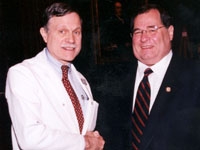
Dr. Oliver Fein (left), associate dean for Network affairs and coordinator of the David Rogers Health Policy Colloquium, and U.S. Congressman Jerrold Nadler.
United States Congressman Jerrold Nadler of New York's 8th congressional district, one of the most demographically diverse districts in New York, was the featured speaker at Weill Cornell's David Rogers Health Policy Colloquium, held in Whitney-117 on Nov. 6. Rep. Nadler, a Democrat who represents an electoral district that runs from Manhattan's Upper West Side to Coney Island, Brooklyn, spoke on "The Future of Politics and Health on the Day After (the Elections)."
Rep. Nadler spoke about the need to address the problem of the uninsured and the lack of a Medicare prescription drug benefit. He expressed concern that the Republican agenda on these issues was inadequate and shared his belief that tax incentives to purchase private insurance would significantly reduce the number of uninsured. Rep. Nadler also commented that private insurance can not offer an adequate prescription drug benefit. As alternatives, Rep. Nadler proposed expanding the Child Health Plus program to reduce the number of uninsured and a prescription drug benefit run by the Medicare program.
Rep. Nadler, a Manhattan resident, was born in Brooklyn in 1947. He first entered politics as a community activist and opponent of the Vietnam War. After serving 16 years in the New York State Assembly, he was elected to Congress in 1992. In November 1994, he began serving his second full Congressional term representing New York's 8th Congressional District.
Congressman Nadler received his undergraduate degree from Columbia University, where he was a Pulitzer scholar, and his J.D. from Fordham Law School. He is a member of the National Governing Council of the American Jewish Congress. He also serves as a member of the New York State Board of Directors of NARAL (the National Abortion Rights Action League) and of ADA (Americans for Democratic Action). He is a past president of District 7-A of the Zionist Organization of America.
The David Rogers Health Policy Colloquium seminar hosts speakers who are knowledgeable in health policy for presentation and discussion. Over the course of the year, participants are introduced to topics in contemporary health policy and politics.

